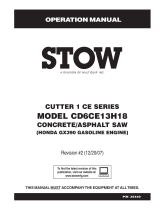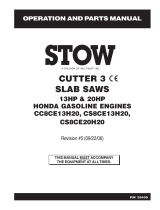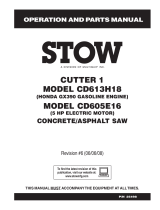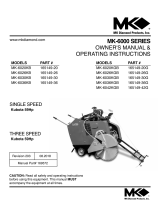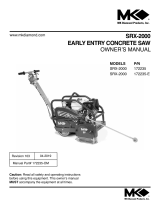Page is loading ...

SAVE THIS MANUAL: KEEP THIS MANUAL FOR SAFETY WARNINGS, PRECAUTIONS, ASSEMBLY,
OPERATING, INSPECTION, MAINTENANCE AND CLEANING PROCEDURES. WRITE THE PRODUCT’S
SERIAL NUMBER ON THE BACK OF THE MANUAL NEAR THE ASSEMBLY DIAGRAM (OR MONTH
AND YEAR OF PURCHASE IF PRODUCT HAS NO NUMBER)
OWNER’S MANUAL AND SAFETY INSTRUCTIONS
FOR QUESTIONS PLEASE CALL OUR CUSTOMER SUPPORT: (909) 628 4900 MON-FRI 9AM TO 3PM PST
14 IN. CONCRETE CUT-OFF SAW WALK BEHIND 5.5 HP
ITEM: 61057

GENERAL SAFETY WARNINGS
Read all safety warnings and instructions. Failure to follow the warnings and instructions may
result in electric shock, re and/or serious injury. Save all warnings and instructions for future
reference.
SAFETY
The warnings, precautions, and instructions discussed in this instruction manual cannot cover all possible
conditions and situations that may occur. It must be understood by the operator that common sense and
caution are factors which cannot be built into this product, but must be supplied by the operator. Read
carefully and understand all ASSEMBLY AND OPERATION INSTRUCTIONS before operating. Failure
to follow the safety rules and other basic safety precautions may result in serious personal injury.
Read and understand all instructions. Failure to follow all instructions may result in serious injury
or property damage.
DO NOT allow persons to operate or assemble the product until they have read this manual and have
developed a thorough understanding of how it works.
This equipment should not be operated by person under 18 years of age
NEVER operate this equipment without proper protective clothing, shatter proof glasses, steel- toed
boots and other protective devices required by the job.
The manufacturer does not assume responsibility for any accident due to equipment modications.
Whenever necessary, replace nameplate, operation and safety decals when they become difcult to
read.
ALWAYS check the machine for loosened threads or bolts before starting.
NEVER touch the hot exhaust manifold, mufer or cylinder. Allow these parts to cool before servicing
engine or saw.
High Temperatures allow the engine to cool before adding fuel or performing service and maintenance
functions. Contact with hot components can cause serous bums.
The engine section of this cutter requires an adequate free ow of cooling air NEVER operate the cutter
in any enclosed or narrow area where free ow of the air is restricted. If the air ow is restricted it will
cause serious damage to the saw or engine and may cause injury to people. Remember the cutter’s
engine gives off DEADLY carbon monoxide gas.
1
ALWAYS use extreme caution when working with ammable liquids. When refuelling, stop the engine
and allow it to cool DO NOT smoke around or near the machine. Fire or explosion could result from fuel
vapors, or if fuel is spilled on a hot engine.
ALWAYS refuel in a well-ventilated area, away from sparks and open ames.
NEVER operate the cutter in an explosive atmosphere or near combustible materials. An explosion or
re could result causing severe bodily harm or even death.
Topping-off to the fuel ller port is dangerous, as it tends to spill fuel.
NEVER use fuel as a cleaning agent.
IMPORTANT SAFETY INFORMATION

ALWAYS read, understand, and follow procedures in operator’s Manual before attempting to operate
equipment.
Stop the engine when leaving the cutter unattended.
ALWAYS be sure to operator is familiar with proper safety precautions and operating techniques before
using the cutter.
Block the unit when leaving or when using on a slope.
Maintain this equipment in a safe operating condition at all times.
ALWAYS stop the engine before serving, adding fuel and oil.
2
NEVER Run engine without air lter. Severe engine damage may occur.
ALWAYS service air cleaner frequently to prevent carburetor malfunction.
ALWAYS store equipment properly when it is not being used. Equipment should be stored in a clean,
dry location out of the reach of children.
NEVER operate this cutter in areas that contain combustible material or fumes. Fire and/or explosions
may result from errant sparks from the equipment.
DO NOT operate this equipment unless all guards and safety devices are attached and in place.
Caution must be exercised while servicing this equipment. Rotating and moving pans can cause injury
if contacted.
Keep all inexperienced and unauthorized people away from the equipment at all times.
Unauthorized equipment modications wilI void all warranties.
DIAMOND BLADE SAFETY
Use appropriate steel centered diamond blades manufactured for use on concrete cutters.
Examine blade anges for damage, excessive wear and cleanliness before mounting blade.
Blade should t snugly on the shaft and against the inside/outside blade anges
ALWAYS inspect diamond blades before each use. The blade should exhibit no cracks, dings, or aws
in the steel centered core and/or rim. Center (arbor) hole must be undamaged and true.
Ensure that the blade is marked with an opera ting speed greater than the blade shaft speed of the cutter.
Only cut the material that is specied by the diamond blade. Read the specications of the diamond blade
to ensure the proper tool has been matched to the material being cut.
ALWAYS keep blade guards in place. Exposure of the diamond blade must not exceed 180 degrees,
Ensure that the diamond blade does not come into contact with ground or surface during transportation.
DO NOT drop the diamond blade on ground or surface.
The engine governor is designed to permit maximum engine speed in a no-load condition. Speeds that
exceed this limit may cause the diamond blade to exceed the maximum safe allowable speed.
Ensure that the blade is mounted for proper operating direction.
IMPORTANT SAFETY INFORMATION

CUTTER TRANSPORTATION SAFETY
Use the lifting bail and appropriate lifting equipment to ensure the safe movement of the cutter.
DO NOT use the handle bars and/or front pointer as lifting points,
NEVER tow the saw behind a vehicle.
Ensure that both pointer bars are positioned appropriately to minimize their exposure during
transportation.
Safeguard against extreme cutter attitudes relative to level. Engines tipped to extreme angles may
cause oil to gravitate into the cylinder head making the engine difcult to start.
NEVER transport the cutter with the blade mounted.
ALWAYS know the location of the nearest re extinguisher and rst aid kit. Know the location of the
nearest telephone. Also know the phone numbers of the nearest ambulance, doctor and re department.
NEVER lubricate components or attempt service on a running machine.
MAINTENANCE SAFETY
ALWAYS allow the machine a proper amount of time to cool before servicing.
Keep the machinery in running condition.
Fix damage to the machine immediately and always replace broken parts.
Dispose of hazardous waste properly. Examples of potentially hazardous waste are used motor oil, fueI
and fuel lters.
SAVE THESE WARNINGS
3
IMPORTANT SAFETY INFORMATION

Honda GX 160 engine: 5.5 HP
Fits bald size: 12 in. to 14 in.
Easy to fold up and transport
Concrete saw cut can be used for both wet and dry selection
High quality engine 5.5 HP powered concrete saw
Bare-tool included
No batteries included and required
Heavy-duty frame construction hinged blade guard
Multi-purpose cutting machine
Blade width: 5.9 in.
Blade length: 13.5 in.
Dimension: 37 in. x 32.7 in. x 19.7 in.
Item weight: 187.3 lbs.
Assembled Product Dimensions (L x W x H) 35.00 x 14.00 x 8.00 Inches
This oor concrete cut saw machine designed specically for this handheld gas power cutter and for multi-
purpose cutting. Its a depth-adjusted cutting machine with super rigid sturdy frame. The construction
ensures concrete saw to straight cut.
LUBRICANTS
4
PRODUCT INFORMATION

5
Introduction/Determining the Right Machine
The machines used for the primary purpose of “at” sawing. This type of sawing is described as “at”
because the pavement is cut somewhere close to a horizontal plane. It is the most common type of
diamond blade cutting. Concrete cutters in the industry are available in a variety of types, sizes and styles,
they range from manual or self propelled in horsepower from 7-72hp. It is possible to cut both concrete
(green or cured, with or without rebar) or asphalt with a concrete cutter.
INSTALLING THE BLADE
1. Be certain that the spark plug is disconnected or saw is unplugged.
2. Remove the blade shaft nut and take off outside blade shaft ange.
3. Clean off any foreign particles on the clamping surfaces of anges and on the mounting surface of the
blade.
4. Place the blade on the blade shaft,lining up the offset drive pin in the blade with the drive pin in the
mounting collar (if the pin system is available on the machine). If your blade has a directional rotational
arrow, position arrow for down cut (diamond tail trailing for down cut).
5. Replace the outside blade shaft ange on the blade shaft. Drive pin on the inside collar must project
through the drive hole in the blade and into the outside collar (if the pin system is available on the machine).
6. Tighten the blade shaft nut securely against star washer and outside ange, using wrench supplied.
7. Reconnect the spark plug or (with switch “off”) plug in the electric supply cord.
Types of Cutting
Cut speed depends entirely on using the correct blade for the material to be cut. Wet or dry, diamond
blades of various specications are available for cutting concrete or asphalt.
Before Starting/Cold Start/Hot Start
BEFORE STARTING
1. Use correct blade for cutting conditions.
2. Ensure arbors and anges are clean and undamaged.
3. Mount blade and tighten securely using wrench.
4. When wet cutting, check water jets for adequate ow.
4. Align pointer with cutter blade.
CAUTION: Set unit up in en open area. Avoid close proximity to structures or other equipment. Failure to
do so may cause Inadvertent injury to operator or other persons in the area.
COLD START: Open the fuel valve under the gas tank all the way. Position the engine stop switch located
on the engine, to run. Open the throttle approximately half way and apply the choke. Pull the starter rope
sharply. When the engine starts, open the choke and adjust the throttle as necessary to keep it running.
Allow the engine to warm up for a few minutes before placing it under the load If the engine doesn’t start
after (3) pulls open choke slightly to prevent ooding. Always operate the engine at full throttle when under
load.
INSTALLATION

6
NOTE: These starting instructions are general guidelines only. Since many engine options are available,
consult the Engine Manual included with this unit for specic instructions.
CAUTION: Gasoline Engines: To improve the engine service life, allow the engine to idle without load for
(2) to (5) minutes before shutting it down. When the idling period is up, use the stop switch located on the
engine and turn it to stop. Close the fuel valve under the gas tank. Engine ooding can occur if the valve
is left open during transport
TO START CUTTING
1. Start engine and let engine warm up. AII cutting is done at full throttle.
2. Align blade and cutter with cut If wet cutting. Open water valve and turn water safety switch on
3. Step on the left side of PEDAL untiI hear a “click”, then turn on the WHEEL HANDLE on the top
of the machine to remove the equipment forward and reverse step down the right side of PEDAL to
change to “push” driving system.
4. Lower blade into cut slowly.
5. Cut as fast as blade will allow If blade climbs out of cut reduce forward speed or depth of cut.
6. Use only enough side pressure on cutter handles to follow cutting line.
Cutting/Belts & Pulleys
CUTTlNG
Lower the blade into concrete to required depth by turning the tilt crank counterclockwise. Ease the saw
slowly forward. Slow forward pressure if the saw begins to stall.
NOTE: For deeper cuts (4 inches/102mm or more) several cuts should be made in incremental steps of
1-1/2 inch (38mm) to 2 inches (51 mm) until the desired depth is reached.
Push the saw steadily forward using the front pointer as a guide. Exert enough forward pressure so that the
engine/motor begins to labor,but does not slow down. If the saw begins to stall, retard forward movement
until full RPM is restored to the blade. If saw stalls, raise the blade out of the cut before restarting. Avoid
excessive side pressure or twisting of the blade in the cut.
BELTS & PULLEYS
NEVER MAKE ADJUSTMENTS TO V7 BELTS AND PULLEYS WHILE ENGINE IS
RUNNlNG
1. The best tension for a v-belt drive is the lowest tension at which the belts will not slip under full load.
2. Take up tension until the belts are snug in the grooves. Run the drive for about ve (5) minutes to “sear”
the belts. The impose the peak load. If the belts slip tighten them until they no longer slip at peak load.
Most new belts will need additional tensioning after seating.
3. Remember, too much tension shortens belt and bearing life.
4. Check the belt tension frequently during the rst day of operation. Check the belt tension periodically
thereafter and make any necessary adjustments.
OPERATION

7
TROUBLESHOOTING

8
LUBRICATION AND SERVICE
Check oil levels, wiring, hoses (air, fuel, water) and lubricate machine daily.
Repair or replace all worn or damaged components immediately.
Check drive belt tension, do not over-tension.
Make sure machine has full set of matched belts.
Check blade shaft make sure arbor and threads are not worn damaged or bent.
Blade shaft bearings should be tight, no free play side-to-side or up and down.
Grease blade shaft bearings daily.
Blade collars should be clean,free of nicks and burrs. No diameter wear and not out of round.
Drive pin not excessively worn or bent and free of gouges.
Flush water through the pump and spray the assembly every night. This prolongs the pump and blade life.
All fasteners and guards are tight and secure.
TROUBLESHOOTING

9
PARTS LIST - MAJOR COMPONENTS

10
PARTS LIST - TRANSMISSION ASSEMBLY

11
PARTS LIST - DEPTH ADJUSTING

12
PARTS LIST - ENGINE ASSEMBLY

13
PARTS LIST - ELECTRIC ASSEMBLY

THE MANUFACTURER AND/OR DISTRIBUTOR HAS PROVIDED THE PARTS LIST AND ASSEMBLY
DIAGRAM IN THIS MANUAL AS A REFERENCE TOOL ONLY. NEITHER THE MANUFACTURER OR
DISTRIBUTOR MAKES ANY REPRESENTATION OR WARRANTY OF ANY KIND TO THE BUYER THAT
HE OR SHE IS QUALIFIED TO MAKE ANY REPAIRS TO THE PRODUCT, OR THAT HE OR SHE IS
QUALIFIED TO REPLACE ANY PARTS OF THE PRODUCT. IN FACT, THE MANUFACTURER AND/OR
DISTRIBUTOR EXPRESSLY STATES THAT ALL REPAIRS AND PARTS REPLACEMENTS SHOULD BE
UNDERTAKEN BY CERTIFIED AND LICENSED TECHNICIANS, AND NOT BY THE BUYER. THE BUYER
ASSUMES ALL RISK AND LIABILITY ARISING OUT OF HIS OR HER REPAIRS TO THE ORIGINAL
PRODUCT OR REPLACEMENT PARTS THERETO, OR ARISING OUT OF HIS OR HER INSTALLATION
OF REPLACEMENT PARTS THERETO.
Record Product’s Serial Number Here:
Note: If product has no serial number, record month and year of purchase instead.
Note: Some parts are listed and shown for illustration purposes only and are not available individually
as replacement parts.
PLEASE READ THE FOLLOWING CAREFULLY
14
WARRANTY
PRODUCT MADE IN CHINA
/
